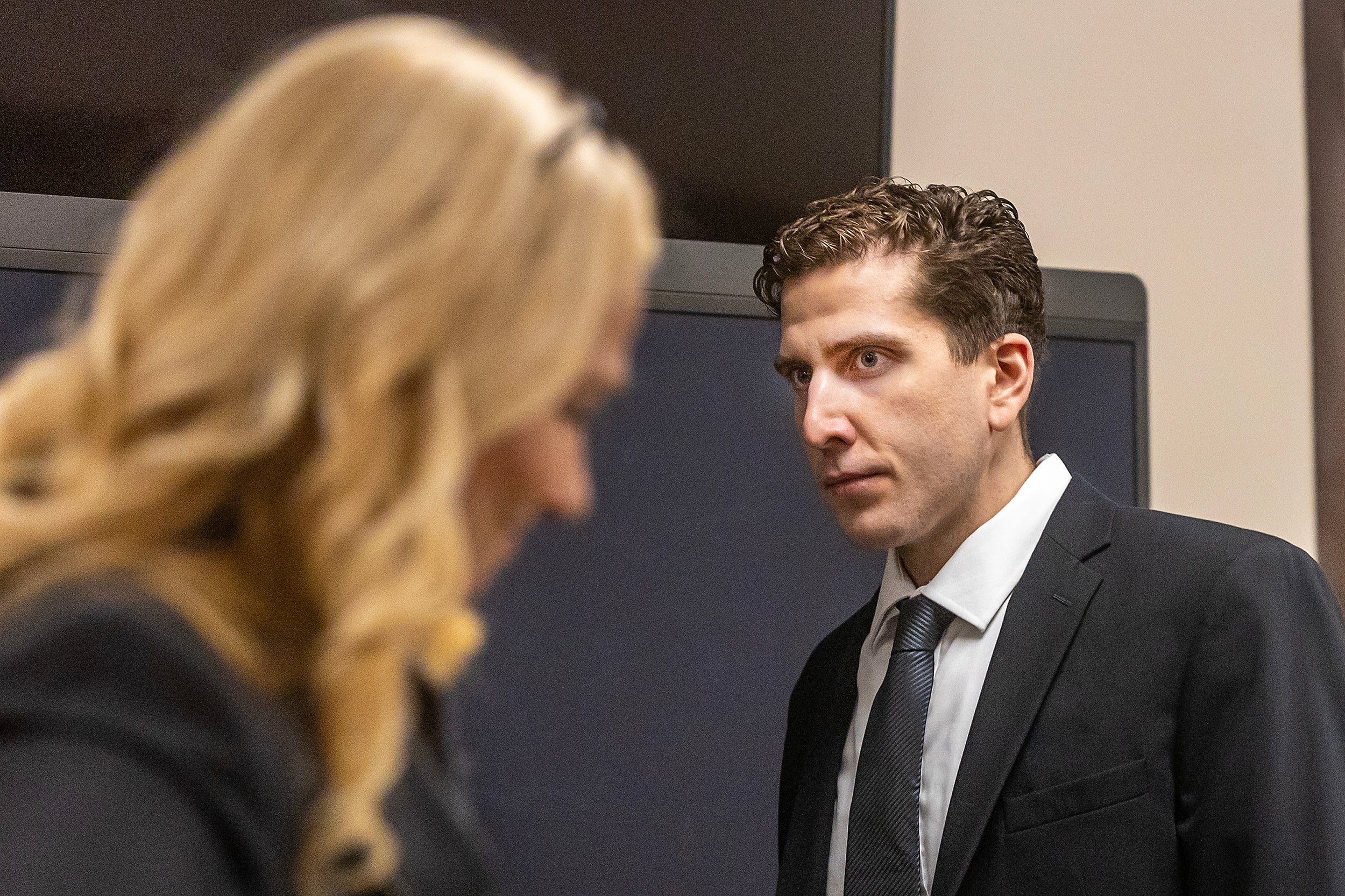Bryan Kohberger judge makes reference to Lori Vallow case as suit-clad Idaho murders suspect appears in court
Accused killer appeared in court in Moscow one day after prosecutors announced intentions to seek the death penalty
The judge overseeing Bryan Kohberger’s death penalty case made a reference to another chilling Idaho murder case during the accused killer’s latest court hearing.
The 28-year-old criminology PhD student appeared in court in Moscow, Idaho, on Tuesday as his lawyers launched their fight for his life in the death penalty case.
Dressed in a dark suit and tie, he appeared solemn as he entered Latah County Courtroom and sat with his defence.
In the hearing, Judge John Judge pointed to the equally high-profile Lori Vallow murder case as he warned the media about the use of cameras in the courtroom.
Judge Judge said that outlets with cameras in the courtroom need to not focus solely on Mr Kohbeger, warning that some media has been “pushing the envelope”.
He pointed out that this was what was happening in “the Daybell case” and warned that, if it continues, cameras could be banned altogether from the courtroom. In Vallow’s case, no cameras were allowed in court at her trial where she was convicted of murdering her two children and conspiring to murder her new husband Chad Daybell’s first wife.
In Tuesday’s hearing, Judge Judge also revised a gag order to clarify that it does include members of law enforcement, investigators and expert witnesses for both sides.
The judge had been expected to hear arguments on several motions filed by the defence in recent weeks, including seeking details about the DNA evidence, seeking details about the grand jury which returned a murder indictment against him, and issuing a stay on proceedings to put a pause on the case heading to trial.
Some of those issues on motion to compel and discovery had been resolved out of court while some will be argued at a later date.
The defence did ask the judge to order the prosecution to hand over some evidence in case.
Among the evidence requested by the defence are training records of three police officers who interviewed “critical” witnesses, information about the FBI team leading the criminal probe, and background on the tip that led to the search for Mr Kohberger’s white Hyundai and cellphone records cited in the probable cause affidavit.

Insisting it is not a “fishing expedition”, Mr Kohberger’s attorneys said they need the evidence to be able to give him a strong defence – particularly now that he is facing a death sentence.
“There is a heightened standard now that the State has announced its intent to seek the death penalty ... and these are very relevant pieces of information,” Mr Kohberger’s attorney said.
Prosecutors argued that most of those materials have already been made available to the defence.
The state also noted that the officers’ training records do not pertain to the case and could set an unfavourable precedent in future cases.
Mr Kohberger’s defence said that while there were more than 120 officers who worked in the murder investigation, they were only requesting records from three of them who played a critical role by collecting evidence, following up on tips and conducting more than a dozen interviews.
The judge told the court that he will be issuing a written ruling with the evidence that the prosecution must turn in by 14 July.
In a series of recent court filings, the defence has argued that the prosecution should hand over all information about the genetic genealogy and DNA evidence which ties Mr Kohberger to the murders of the four slain students Kaylee Goncalves, Madison Mogen, Ethan Chapin and Xana Kernodle. This includes information about the scientists who carried out the DNA testing and what it was that led authorities to suspect him in the first place.
Investigators linked the 28-year-old criminology PhD student to the murders through a military knife sheath that the killer allegedly left behind at the scene of the 13 November stabbings.
The sheath was found next to Mogen’s body in her bed on the third floor of the student home.
DNA discovered on the sheath was found to be a match to Mr Kohberger after the FBI checked the sample against genetic genealogy databases and “tipped off” local authorities, according to prosecutors.
After collecting trash from the suspect’s parents’ home in the Poconos Mountains, a familial match from Mr Kohberger’s father was first made to the knife sheath before a “statistical” match was made to the accused killer himself through DNA samples taken following his arrest on 30 December.
But, Mr Kohberger’s defence is seeking to cast doubts on the state’s use of genetic genealogy in the case.

In a court filing submitted last week, his attorneys insisted he has “no connection” to the four slain students and claimed that DNA from three other unidentified men was also found at the grisly crime scene.
DNA from two other men was found inside the off-campus student home while DNA from a third unknown man was found on a glove found outside the property on 20 November, the documents state.
“By December 17, 2022, lab analysts were aware of two additional males’ DNA within the house where the deceased were located and another unknown male DNA on a glove found outside the residence on November 20, 2022,” Mr Kohberger’s attorney Jay Logsdon writes in the filing.
“To this date, the Defense is unaware of what sort of testing, if any, was conducted on these samples other than the STR DNA profiles.
“Further, these three separate and distinct male DNA profiles were not identified through CODIS leading to the conclusion that the profiles do not belong to Mr. Kohberger.”
The defence also said that there is no DNA evidence from the victims in Mr Kohberger’s apartment, office, home, or vehicle.
The suspected killer’s legal team accused prosecutors of “hiding its entire case” from the defendant by trying to keep its method of “genetic genealogy investigation” secret.
They claim that authorities don’t want the suspect to see “how many other people the FBI chose to ignore during their investigation”.
The defence is also demanding prosecutors hand over the DNA profiles of the three other males whose DNA was found at the scene.
In a separate motion, the defence is also asking the court to force prosecutors to hand over all records around the grand jury proceedings which culminated in Mr Kohberger’s indictment on four counts of murder and one burglary charge.
The legal team argues it is crucial to him fighting the indictment against him.

A third motion being argued is around a stay of proceedings, with the defence arguing that the case should be put on hold until the matter of the grand jury record is resolved in court.
Mr Kohberger’s latest court appearance came one day after prosecutors announced they are seeking the death penalty against him, saying that the murder was “especially heinous, atrocious or cruel, manifesting exceptional depravity” and that the defendant showed “utter disregard for human life”.
Mr Kohberger is scheduled to stand trial on 2 October for the murders of Goncalves, 21, Mogen, 21, Kernodle, 20, and Chapin, 20.
Mr Kohberger is accused of breaking into an off-campus student home on King Road in the early hours of 13 November and stabbing the four students to death with a large, military-style knife.
Two other female roommates lived with the three women at the property and were home at the time of the massacre but survived.
One of the survivors – Dylan Mortensen – came face to face with the masked killer, dressed in head-to-toe black and with bushy eyebrows, as he left the home in the aftermath of the murders, according to the criminal affidavit.
For more than six weeks, the college town of Moscow was plunged into fear as the accused killer remained at large with no arrests made and no suspects named.
Then, on 30 December, law enforcement suddenly swooped on Mr Kohberger’s family home in Albrightsville, Pennsylvania and arrested him for the quadruple murders.

The motive remains unknown and it is still unclear what connection the WSU PhD student had to the University of Idaho students – if any – prior to the murders. The murder weapon – a fixed-blade knife – has still never been found.
As a criminal justice PhD student at WSU, Mr Kohberger lived just 15 minutes from the victims over the Idaho-Washington border in Pullman.
He had moved there from Pennsylvania and began his studies there that summer, having just completed his first semester before his arrest.
Before this, he studied criminology at DeSales University – first as an undergraduate and then finishing his graduate studies in June 2022.
While there, he studied under renowned forensic psychologist Katherine Ramsland who interviewed the BTK serial killer and co-wrote the book Confession of a Serial Killer: The Untold Story of Dennis Rader, the BTK Killer with him.
He also carried out a research project “to understand how emotions and psychological traits influence decision-making when committing a crime”.




